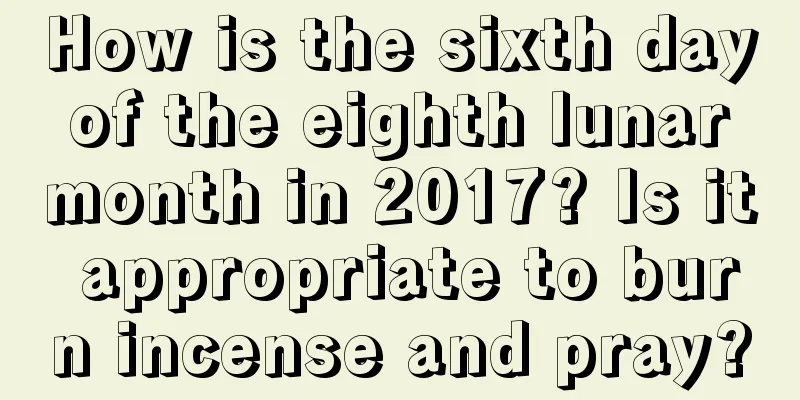What month is the twelfth month of the lunar calendar and what are its customs? What month is the twelfth month of the lunar calendar in 2018 in the solar calendar?

Introduction: There are 12 months in a year, and different months have both the new calendar and the lunar calendar. So what month is the twelfth month of the lunar calendar? What month is the twelfth month of the lunar calendar in 2018 in the solar calendar? It is the twelfth month of the lunar calendar in 2018, and the coldest days of winter have arrived. Follow Mr. Shui Mo's website and we will accompany you through the cold winter.What month is the twelfth month in the lunar calendar?The twelfth month of the lunar calendar is also known as the twelfth month or the wax month. There are many traditional folk activities during the twelfth lunar month. This title has little to do with the natural seasons, but is mainly related to the annual sacrifices. The so-called "La" was originally the name of the sacrifice at the end of the year. Han Ying Shao's "Customs and Meanings" said, "In the Xia Dynasty, it was called Jiaping; in the Yin Dynasty, it was called Qingsi; in the Zhou Dynasty, it was called Da La; and in the Han Dynasty, it was changed to La. La means hunting, which refers to hunting animals to sacrifice to the ancestors." Or it is said, "La means connection, the connection between the new and the old, so a big sacrifice is held to reward the merits." Whether it is offering animals to ancestors after hunting, or worshiping gods at the turn of the old and the new, sacrificial activities are still required, so the twelfth lunar month is a month for sacrifice.What month is the twelfth lunar month in 2018 in the Gregorian calendar?The twelfth month of the lunar calendar in 2018 is from January 6, 2019 [the first day of the twelfth lunar month] to February 4, 2019 [the 30th day of the twelfth lunar month]Therefore, the twelfth lunar month of 2018 includes the first and second months of the solar calendar. What are the customs of the twelfth lunar month?Customs of the twelfth lunar month: The eighth day of the twelfth lunar month <br /> Laba porridge is a kind of porridge cooked with various ingredients on the Laba Festival, also known as seven treasures and five flavors porridge. Eating Laba porridge is a tradition to celebrate the harvest and has been passed down to this day.The customs of the twelfth lunar month: the 23rd day of the twelfth lunar month <br /> The 23rd day of the twelfth lunar month, also known as "Little New Year", is the day for the Han people to worship the kitchen god. The Han people have a custom that "men do not worship the moon, and women do not worship the Kitchen God", so worshiping the Kitchen God is limited to men. As the folk song goes, "Zhang, Wang, Li and Zhao, worship the Kitchen God on the 23rd." After eating the sweet melons offered as a worship gift and worshiping the Kitchen God, they will enthusiastically throw themselves into the busy preparations for the New Year. The customs of the twelfth lunar month: the twenty-fourth day of the twelfth lunar month The custom of "dusting and sweeping the house on the 24th day of the twelfth lunar month" has a long history. It is a traditional custom of our people. In the north it is called "sweeping the house" and in the south it is called "dusting". Every household has to clean the environment, wash various utensils, take apart and wash bedding and curtains, sweep the courtyard, dust off dust and cobwebs, and dredge open and underground ditches. In the north, cleaning the house in the twelfth month of winter means just dusting and sweeping, but in the south, tables, chairs, benches, and even large bunk beds are often carried to the riverside or well to be cleaned. Customs of the twelfth lunar month: The twenty-fifth day of the twelfth lunar month <br /> In the past, tofu was a must-have food during the Chinese New Year. On the 25th day of the twelfth lunar month, people would grind the soaked soybeans with a stone mill, "knead the foam, sieve it to remove the residue, boil it until it becomes a paste and blocks." After the tofu is made, it is cut into small pieces and stored in clean water with salt for consumption during the Spring Festival. Because the word "fu" in "tofu" sounds like "fu", which sounds like "rich", grinding tofu on the 25th symbolizes a prosperous year and a prosperous life in the coming year. There is also a saying that "paper the windows on the 25th", which means that after sweeping the house on the 24th of the twelfth lunar month, it is time to paper the windows on the 25th. With the development of society, most families have lost the tradition of pasting paper on windows, but pasting window flowers, auspicious characters and hanging couplets are indispensable procedures. In short, people’s wishes for a prosperous new year are the same. The customs of the twelfth lunar month: The twenty-sixth day of the twelfth lunar month <br /> Killing pigs and cutting meat for the New Year As the saying goes, "On the twenty-sixth day of the twelfth lunar month, kill pigs and cut meat for the New Year." It means that on this day, meat is mainly prepared for the New Year. Killing pigs means killing pigs raised at home; cutting meat means people who do not raise pigs go to the market to buy meat for New Year's meal. The economy of the farming society was underdeveloped and people lived a hard life. They could often only eat meat during the New Year, so it was called "New Year's meat." The customs of the twelfth lunar month: the twenty-seventh day of the twelfth lunar month<br /> The twenty-seventh day of the twelfth lunar month is the eve of the Chinese New Year. There is a folk saying that goes "the twenty-seventh day of the twelfth lunar month, slaughter chickens and go to the market." On this day, every household not only slaughters their own poultry, but also goes to the market and shops to make centralized purchases. Compared with the market on ordinary days where the main purpose is to buy what is in short supply and sell what is in surplus, the market on the 27th day of the twelfth lunar month is mainly for buying and selling New Year items, such as firecrackers, spring couplets, incense and candles, burning paper, beef and mutton, various toys and gifts for children, various head ornaments for girls, etc. On this day, markets everywhere are very busy and lively. Customs of the twelfth lunar month: The twenty-eighth day of the twelfth lunar month <br /> Ordinary flour cannot be stored for a long time, but fermented flour is not easy to spoil. On the 28th day, dough is fermented to prepare the staple food from the first to the fifteenth day of the first lunar month. In most places, people rush to prepare steamed noodles for the New Year on this day. People in Taiyuan steam "two baskets of cakes and steamed buns"; people in Hebei steam "jujube flowers" as offerings to their ancestors on New Year's Eve; and people in Henan also steam steamed buns and fry guta on the 28th. Only people in Beijing are a step behind, letting the dough rise on this day and waiting until the 29th to steam the steamed buns. The customs of the twelfth lunar month: The twenty-ninth day of the twelfth lunar month<br /> The day before New Year's Eve is called "Little New Year's Eve", when families hold banquets and people visit each other, which is called "farewell to the old year". Burning incense outdoors is called "Tianxiang" and usually lasts for three days. At the same time, on this day, every household will compete to make noodles. Because neighbors have the habit of exchanging food with each other, the appearance and taste are naturally very particular. Customs of the twelfth lunar month: New Year's Eve <br /> New Year's Eve is the time when the old year turns to the new year, and all industries and businesses stop trading. Everyone is making good plans at home, hoping for better luck in the new year. The sound of firecrackers was heard throughout the night. There are also many different activities on New Year’s Eve - putting up hanging scrolls, setting up altars for heaven and earth, saying goodbye to the old year, staying up all night, welcoming the new year... these celebrations follow one after another. When midnight arrives, the twelfth lunar month ends and the new year begins. |
Recommend
Is a girl born on the 14th day of the first lunar month, the day before the Lantern Festival in 2020, born under the earth element?
Introduction: Although everyone cannot choose the ...
Is the 29th day of the sixth lunar month in 2019 a good day for traveling far away?
The sixth lunar month is a beautiful time when lot...
Where is the God of Wealth on the 20th day of the seventh lunar month in the Year of the Pig 2019? Five elements attributes of the day
People always ask: Love or bread? In fact, love a...
Is May 25th of the lunar calendar in 2022 an auspicious day for visiting graves and worshiping ancestors?
Choosing different times to visit the graves and w...
What is the fate of a Rat boy born on Mother’s Day? Are you tough?
Every parent hopes that the boy will have a good f...
Is the fate of a girl born on October 17th of the lunar calendar good? Are you born to bring good luck to your parents?
Introduction: The destiny journey of every child b...
Is April 28th of the lunar calendar in 2019 a good day to burn incense and worship Buddha?
Burning incense is a way for us to express respect...
What is the Xiayuan Festival and when is it in 2019?
Among China's traditional sacrificial festival...
What should we pay attention to in farming during the Great Cold? Will 2020 be very cold?
The Great Cold solar term is still a winter solar ...
Is the Dragon Boat Festival 2018 a suitable time for engagement? What do you need to prepare for an engagement?
The Dragon Boat Festival is one of my country'...
What are the customs and taboos for the 20th day of the twelfth lunar month in 2018? What's the point?
Introduction: The twelfth lunar month is an import...
What day of the week is the Chinese New Year in 2018? Are there any taboos?
"The sound of firecrackers bids farewell to t...
Is it okay to hold a banquet on the Minor Cold Day tomorrow in 2021? Will there be a cold wave on the Minor Cold Day in 2021?
Introduction: It is also necessary to choose an au...
What’s missing in the horoscope of people born on October 8, 2019, during the Cold Dew period?
What’s missing in the horoscope of people born on ...
What date is the sixth day of the fifth lunar month in 2019? What day is it?
The earthly branch of the fifth month in the luna...









